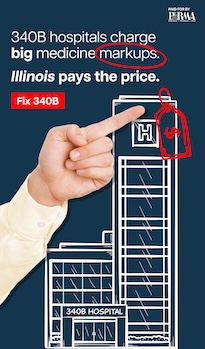Weekend updates: CPS; CTU; GOP
Saturday, Sep 21, 2024 - Posted by Rich Miller
* Background is here. ABC7…
Multiple sources told ABC7 Chicago Friday that Chicago Mayor Brandon Johnson has told Chicago Public Schools CEO Pedro Martinez he no longer wants him as head of the school district. […]
Both men were set to attend a gala for the City Council’s Latino Caucus Friday night in Bridgeport, but that was before Friday’s news broke. They were no-shows at an event that is typically a who’s who of Chicago politics.
The CPS CEO wrote a letter to CPS families Friday, saying in part, “me and my leadership team are 100 percent focused on building on the positive momentum of the new school year,” defying, what multiple sources tell ABC7, is the mayor’s call for his resignation, with only the school board able to fire him.
“Me and my”? Great grammar for an education CEO. /s
The letter…
Sun-Times…
The seven-member board, which was appointed by Johnson, has the sole authority to dismiss the CPS CEO but has sided with Martinez this year in a couple of key disputes.
A senior aide to the mayor said on the condition they remain anonymous that Martinez now “has lost the board.”
Chicago Board of Education President Jianan Shi didn’t answer calls Friday.
The mayor’s office and Martinez have clashed on financial issues. Johnson wants the school district to take out a short-term loan to pay for costs related to a new Chicago Teachers Union contract, which is still being negotiated, and to pay a part of the city’s contribution to the municipal pension fund. City Hall had historically made that payment until former Mayor Lori Lightfoot shifted the cost to CPS because more than half of the fund’s members are school district employees.
Illinois Latino Agenda…
The following is a statement from the Illinois Latino Agenda in response to the ongoing reports that Mayor Johnson continues on his quest to oust CPS CEO Pedro Martinez:
“Latino leaders are deeply concerned by the ongoing speculation and political distractions surrounding the future of CPS CEO Pedro Martinez, who has been a stabilizing force for CPS. Just this week, under his leadership, the Chicago Board of Education unanimously approved the passage of a five-year strategic plan aimed at improving the quality of education for all students and getting more kids into our neighborhood schools.
“Now, more than ever, the focus must remain on students, their educational achievements and the continued success of CPS. Under Martinez’s leadership, students’ reading scores have increased, and more high school students are graduating with college credits, providing them with a head start toward higher education.
“Mr. Martinez’s leadership has delivered measurable results. Ultimately the CPS board is officially responsible for any decision to remove a leader who has demonstrated a commitment to improving educational outcomes for all CPS students.”
* Background is here. CTU official…
* Background is here and here. Marni Pyke…
Controversial North Carolina Lt. Gov. Mark Robinson has pulled the plug on a much-criticized speaking appearance at a GOP fundraiser, according to the Tenth Congressional District Republican Organization’s website.
The announcement that appeared Saturday noted “Our earlier speaker canceled, but we have secured a great Trump ally for this event!”
You knew that would happen.













